BUNNY WAILER
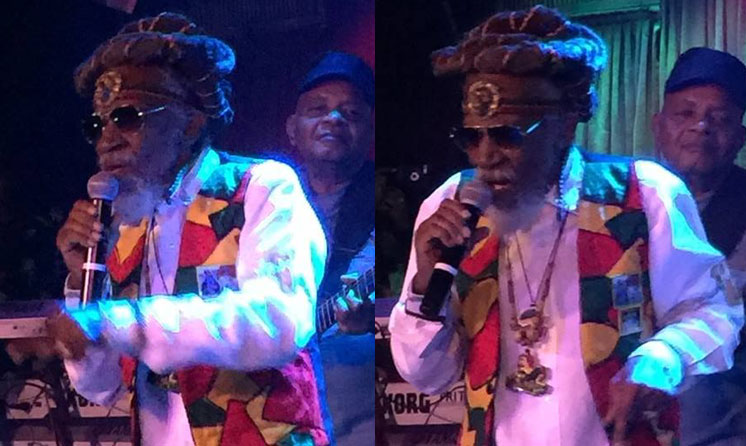
Bunny Wailer live at BB King's, NYC, May 2016, © Jason Gross, 2021
Tribute: The Last Surviving Wailing Wailer
by Eric Doumerc
(August 2021)
Neville O'Riley Livingston was born on 10 April 1947 in Kingston, Jamaica. He was the son of Thaddeus Livingston, a carpenter and craftsman who lived in Trench Town who also had a rum bar, next door to Bob Marley's family. Bunny soon became Bob's friend and singing partner. Before moving to Trench Town with his family, young Bunny grew up in Nine Mile with his childhood friend Marley, and attended the same school in the neighbouring village of Stepney.
In Kingston, Bunny formed a vocal trio with Marley and a young guitarist they met on the streets of Kingston, Peter Tosh (Winston Hubert McIntosh). Together, the formed the Wailing Wailers and first recorded for the producer Clement Dodd at his Studio One. They released their first single, "Simmer Down" in 1963 and remained at Studio One until 1966, when they decided to leave. They were dissastisfied with the way Clement Dodd treated them.
After leaving Studio One, the Wailers, as they had become known, recorded for various producers, like Leslie Kong, Bunny Lee, Lee Perry, and started ther own label, called Wail'M Soul'M. Marley was lead singer then and Tosh and Livingston were on harmonies. They also occasionally contributed their own songs to the trio's repertoire. Each had their own distinctive vocal style, and Bunny patterned his after the African-American soul singer Curtis Mayfield. Mayfield's group, The Impressons, was a major influence on the early Wailers, as they were on so many young Jamaican artists. At Studio One, the Wailers had recorded ska tunes, romantic ballads, spirituals, covers of famous pop songs, and socially conscious material, and Bunny's contributions had included "Sunday Morning," the pro-Rude Boy "Let Him Go," the Rastafarian-tinged "I Stand Predominate," "Cry To Me," and "Who Feels It Knows It." "Sunday Morning" was recorded as a doo-wop ballad and reflects the influence of African-American music at the time. It was later covered by Gregory Isaacs.
When they moved to Lee Perry's Upsetter label in the early 1970's, Bunny contributed at least three tracks: "Dreamland," a cover of a tune by an obscure Amercian band called The El Tempos, "Riding High," and the rebellious "Brain Washing," which lamented the nefarious influence of the Jamaican education system on young children ("It's pure brainwashing/Coming through to poor man's child"). "Tread Oh" was another of his compositions, released on the Wailers' own label, Wail'M Soul'M.
By the time The Wailers struck a deal with Island Records, Bunny was a seasoned singer and songwriter, but had not managed to contribute many songs to the trio 's output. The Wailers' second album for Island, Burnin', did contain two beautiful tracks by Bunny, the spiritual "Hallelujah Time," the second track on the album, and "Pass It On," which was later incorporated into the soundtrack to the Countryman film in the early 1980's. Both songs contrasted sharply with the Marley and Tosh contributions, and were more soul-influenced.
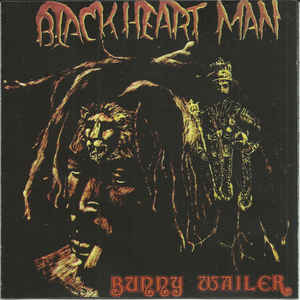
After the Wailers' break-up following the ill-fated 1973 British tour, the three singers went their separate ways and released individual albums. Bunny Wailer's first album as a solo artist was Blackheart Man, which contained tracks like the epic title-track, "Amagideon (Armagedon)," "Fig Leaf," "Rasta Man," "Fighting Against Conviction," and "This Train." It is acknowledged to be Bunny Wailer's masterpiece, and the arrangements are very sophisticated. It concludes with a soulful version of the old spiritual "This Train," also covered by the harmony trio Culture in the late 1970's.
The whole album is a masterpiece, but two tracks seem to stand out: the title track and "Battering Down Sentence" (aka "Fighting Against Conviction"). The former is a moving and poetic narrative whose main character is the "blackheart man," a kind of bogeyman figure Jamaican children were told about in the 1940's and 1950's in order to encourage them to behave: if you don't behave, the blackheart man will come and take you away. It seems that, for many Jamaicans at the time, the figure of the Blackheart Man had a real-life correspondence in the figure of the Rastaman, with his long dreadlocks, alternative lifestyle, and ganja smoking. In Wailer's narrative, the Blackheart Man is the lone Rastaman living apart from society and bearing Jah's cross alone. For Wailer, the Blackheart Man seemed to symbolise the condition of the black man in exile. Wailer's semi-autobiographical narrative tells a story a of going beyond appearances and of finding out by experience who the Blackheart Man really is. The second track, "Fighting Against Conviction," is based on Bunny's own experience of being sent to prison for possession of marijuana in 1967. He was sent to the General Penitantiary and then to a prison farm. The song relates in poetic language the story of a young man from the ghetto and who has to survive one way or another and is finally given a custodian sentence by a "judge and an angry jury." He can't grow "no crops " in the concrete jungle he grew up in and the dice are loaded against him.
This first album was followed by two roots albums, Protest and Struggle, in which social and political themes predominated. On Protest, Bunny reworked The Slickers' "Johnny Too Bad" with new lyrics, but keeping the general melody. Other highlights on the album included a searing and funky version of "Get Up Stand Up," as well as "Scheme of Things," loosely based on the Wailers' "Trench Town Rock."
Struggle, released in 1979, featured the great track "The Old Dragon," which Bunny would later use as an introductory song for his concerts as well as, the sprightly and spiritual "Bright Soul," and the battle hymn "Struggle," which encouraged listeners to "trample the dragon."
The changes affecting Jamaican popular music in the late 1970's/early 1980's led to a new type of reggae music taking over; dancehall. Bunny Wailer adapted to these changes by releasing a series of albums with The Roots Radics, the leading session band at the time; Rock and Groove and In I Father's House, all containing compelling tracks.
1980 saw the release of In I Father's House (later re-released on the American Shanachie label as Roots Radics Rockers Reggae), an album which contained a mixture of dance-oriented tracks ("Rock In Time," "Rockers") and more traditional material (a remake of "Let Him Go," "Roots Raddics," "Love Fire"). The outstanding track on this album has to be "Roots Raddics," which celebrated the power of reggae music as a revolutionary force while namechecking the backing band most associated with the new dancehall sound, the Roots Radics. The "radics" in the song are the radicals in cities pushing for change. That album also included the song entitled "Rockers," which was of course the theme song for the soundtrack to the film of the same name. The Shanachie release added "Cease Fire" and "The Conqueror" (also released as a twelve-inch on Bunny's Solomonic label) to the original album.
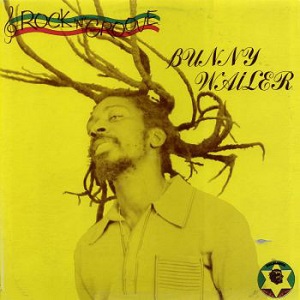
Rock and Groove was released in 1981 and raised more than a few eyebrows on account of the new direction Bunny Wailer seemed to be following; most of the tracks were odes to the dancehall and seemed far removed from the roots ideology present on the earlier albums. Tracks like "Dance Rock," "Cool Runnings," and "Rock and Groove" celebrated the hedonistic milieu of the dancehall and this may well have been a reaction to the heavy toll taken by the 1980 elections which led to the victory of the Jamaica Labour Party. One outstanding track was "Ballroom Floor," loosely based on Bob Dylan's "Like A Rolling Stone," a song the young Wailers had cut at Studio One in the 1960s. Bunny kept the melody and changed the lyrics, and it worked beautifully.
In December 1982, Bunny Wailer gave a concert that was part of the Youth Consciousness Reggae Festival held at the National Stadium, Kingston, Jamaica, and was backed by the Roots Radics, along with a horn section which included Dean Fraser, Junior Chico Chin, and Ronald Nambo Robinson. Gem Myers provided back-up vocals. That legendary performance was relased as a live LP (Live!) in 1983. The first "side" of the original LP featured great versions of "Blackheart Man," "Armagedon," and "Crucial," three "roots" tracks, whereas the second side was the dancehall side, with "Dance Rock," "Rock and Groove" and "Ballroom Floor." The album closed with a great version of Peter Tosh's "Toughest." "Dance Rock" was done in a slow, majestic groove with great horns and plenty of echo in the mix and was one of the highlights of the show. "Rock and Groove" included a long dubwise passage with great percussion provided by Sticky Thompson and Harry T Powell. "Ballroom Floor" also featured a great bass and drum workout by Sly and Robbie.
Marketplace was released in 1985, with Sly Dunbar on drums and Robbie Shakespeare on bass, and contained beautiful tracks like "Stay With The Reggae," "Dance Hall Music," and "Cool and Deadly."
1987 saw the release of Rule Dancehall, in which the veteran singer addressed the new dancehall deejays, and set out to show them how to "rule dancehall." At the time, the new dancehall style had led to a major controversy in Jamaican society about the direction Jamaican music was following, and the advent of "slackness" had led to a moral panic in certain sections of society. This album featured beautiful renditions of Bob Marley's "Stir It Up" and Sam Cooke's "Saturday Night." "Trash Inna We Best" and "Haughty Tempo" were compelling tracks in which Bunny tried to develop his own vision of dancehall music.
Parallel to these developments, Wailer also took on the Wailers' mantle and set out to perpetuate the Wailers' legacy with a series of tribute albums like Bunny Wailer Sings The Wailers (1980), Tribute, and Hall of Fame: A Tribute to Bob Marley's 50th Anniversary (1995).

Bunny Wailer Sings The Wailers, recorded with Dunbar and Shakespeare, contained modern renditions of songs by Marley ("Hypocrite," "Mellow Mood"), Peter Tosh ("I'm The Toughest," "Burial") and Bunny himself ("I Stand Predominate," "Dancing Shoes") and in his thoughtful liner notes, Dermot Hussey pointed out that Bunny Wailer had "woven a continuum of Wailers music" and that the Wailers were like "a tree [which is] viewed from different sides, but is in essence the same tree."
Bunny Wailer was also interested in dub music and the art of dub mixing, and in 1978, he released an album entitled Dub d'sco Vol.1, which consisted in dub tracks based on the Blackheart Man album. This was followed in 1981 by the Dub d'sco Vol.2 LP, which did the same for the Bunny Wailer SingsThe Wailers album. These two albums were later released on a single CD (in 1999) on the American RAS label, with liner notes by Roger Steffens. These two albums contained mixes by the famed sound engineers Sylvan Morris and Karl Pitterson, and gave reggae enthusiasts the chance to explore a facet of Bunny Wailer's art few were aware of at the time. Even the titles of these albums elicited fans' curiosity at the time. Indeed, the spelling "d'sco" atrracted considerable attention. This is Bunny's explanation; "That's just a little experiment, to give it that sound. The title experiments on that mix there. You don't get the "dis." It's a new word, like "electric side," another word that people are doing up till now" (Steffens, liner notes).
Bunny was here referring to a song he wrote for Marcia Griffiths entitled "Electric Boogie" and which was a hit in the Washington DC area in the late 1980's. But in fact, the song was composed by Bunny in the early 1980's. According to Griffiths; "A gig that I-Threes went to do in Toronto didn't turn out too wondeful. I got maybe about 700 dollars, and I invested in a keyboard in Canada - a rhythm box - and it was the greatest buy I've ever made, because it had every single sound on it. I took it in the studio with brother Bunny, and Bunny was fascinated with the same sound that I loved, which was the piano playing the repeater sound, "nenga-nenga-nenga-nenga," so that was what we put down first on tape, adn then the rhythm, "boom, baff, boom, baff." Bunny is a talented songwriter, and one of the greatest producers I know. He took that home in the country, and the following morning he came back with the song "Electric Boogie." The song was released coming up to Christmas in 1982 and it went straight to the number one spot, and ever since there was never a dead period of it not selling anywhere" (Katz, 335). Years after it was released in Jamaica, that song became very popular in the Washington DC area and started a new dance craze; the electric slide. The craze apparently started in the northeast of DC in 1989; "It started in the clubs in Northeast DC about a year ago," explains Washington scenemaker Dera Tompkins," places that keep alive old dances like the Madison and the Stroll. Some say it was invented in the Chateau, a place frequented mostly by older people. It cought on immediately and spread down to the younger kids. You'll find folks doing it everywhere, from go-go joints to African clubs, to the discos. Even the white clubs in the suburbs feature it. It's the common denominator in black DC.Every age, every household is doing it" (Roger Steffens, "Electric Bunny Hop," The Beat, Vol.9 #1, 1990).
In August 1986 Bunny gave a concert at the Madison Square Garden and this show was released on VHS in the same year (Blackheart Man, Castle Hendring, 1986). Bunny started the concert with "The Old Dragon," continued with "Blackheart Man," and then on to "Dreamland" and "Love Fire." "Struggle and " Rise and Shine" completed the roots segment of the show, which was followed by a dancehall segment, starting with "Rockers" as a transition. Then came "Dance Rock," "Rock and Groove," "Rootsman Skanking" and "Cool Runnings." Bunny ended the show with a fast-paced Wailers medley which included "Rude Boy," "Jailhouse," "I Stand Predominate," "Toughest" and "Hypocrites," taking the audience back to the Wailing Wailers' days in the 1960. The concert ended with the song "Together Again," performed with Constantine "Dream" Walker and Junior Brathwaite, who had both performed with the young Wailers at some point in the 1960s. Constantine Walker had replaced Bob Marley in the group when the latter had moved to Delaware for a few months in 1966 to make some money. Backed by the Roots Radics, and trumpeter Johnny Moore from the Skatalites, this was a resplendent show, unfortunately marred by some acoustic problems and the unsophisticated dance moves of the dancers performing with Bunny on that show. But overall, the musical backing by the Roots Radics was impeccable, and the division of the concert into two segments (roots and dancehall) allowed the audience to experience and explore the two facets of Bunny Wailer's music.
In 1988, Bunny released an album entitled Liberation, which was hailed as a major work at the time and was followed by an American tour. This album contained the songs "Botha The Mosquito" (referencing the Apartheid leader of South Africa), which was released as a 45 at the time, the powerful "Rise And Shine," and "Serious Thing" (also released as a 45).
The 1990s saw the release of Gumption, Just Be Nice, and Dance Massive. Gumption featured excellent versions of The Maytals' "Never Grow Old," Johnny Osbourne's "Warrior," and the Wailers' "Bus Dem Shut ("Burst Their Shirts"). With "Don Man," Bunny revived his old pro-rude boy tune "Let Him Go," a tune he went back to several times in his long career, but the gem of the album has to be his modern version of "Bus Dem Shut," an early Wailers tune first recorded for the trio's own label. This album also contained "Sound Clash," Bunny's tribute to the sound system tradition, and "Reggae Burden," which referred to his mission in life.
The success of the "Electric Boogie" tune mentioned earlier and of the dance craze it initiated in the DC area led Bunny Wailer to release the Just Be Nice album in 1990. It contained rap-inflected and soul-influenced tracks that were obviously meant for the American market. The album was recorded at the Mixing Lab studio in Jamaica and also at the Power Play studio in New York, with lead guitar by the Russian musician Anton Pushansky. Owen "Fox" Stewart co-produced the album and contributed backing vocals too. The album is a truly international affair, with rap, soul music and reggae cohabiting happily. Outstanding tracks area remake of "Ballroom Floor," loosely based on again Bob Dylan's "Like A Rolling Stone," previoulsy covered by the Waielrs, and a new version of "Riding," another Wailers tune. There is also a cover of Sly and the Family Stone's "Family Affair," and a rap number entitled "Hit Back the Crack," which encouraged youngsters to avoid crack cocaine. The title track was a rap number too. "Soul Rocking Party" and "Back to School," previoulsy recorded by Bunny, were nicely reworked and revamped for the album too.
Dance Massive, released in 1992, contained tunes like "Ram Dance," "Raggamuffin" and "Don Dadda" which consituted Bunny's response to a nasty incident which had taken place at a dancehall concert (the anuual Sting Festival) on Boxing Day December 1990: some dancehall fans had angrily thrown bottles and other missiles at Bunny, forcing him to leave the stage. Apparently some dancehall fans had grown tired of the Rastafarian-inspired music symbolised by Bunny Wailer and had voiced their impatience. They were all waiting for the much-anticipated clash between the two big deejays of the time; Shabba Ranks and Ninja Man. That incident seemed to indicate that a major generational shift had taken place in Jamaican society, with dancehall being now the music that the public wanted. As with the Rule Dancehall album, Bunny responded by telling the young deejays and dancehall fans that he had been rulling dancehall ever since they were children and that he did not need to be reminded how to sing a dancehall tune. Tunes like "Still The King" and "Veteran" made that point very clearly.
The 1990's also saw the coming to fruition of a project which was close to Bunny's heart; a reunion of the original Wailers. With Bob Marley and Peter Tosh no longer with us, Bunny asked Constantine "Vision" Walker and Junior Brathwaite, who both sang with the original trio in the early days, to participate in a Wailers reunion album in order to commemorate and preserve the Wailers' legacy. The album was released in 1993 under the title The Never-Ending Wailers, and featured versions of songs like "Coolie Plum Tree," "Hammer," "Music Lesson," "Nice Time" (both released in the 1980s first), "I'm Still Wailing," and "It Hurts To Be Alone." One of the outstanding tracks is "Rescue Me," which is a song the Wailers used to rehearse in their backyard and which was later recut by Peter Tosh as "Rumours of War" on his Mystic Man album. Andrew Tosh, Peter Tosh's son, contributed vocals too. The album was to have been released in the 1980's under a different title (Together Again), but, due to legal issues, its relased was delayed until 1993. The original tracks were reworked and enhanced with new vocals and instruments added, and some of the tracks were laid at Channel One studio with Sly and Robbie.
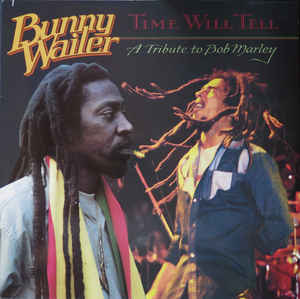
In 1990, Bunny released an album entitled Time Will Tell; A tribute to Bob Marley, which contained outstanding versions of "Redemption Songs," "Soul Rebel," and "War" among others. This album was rewarded by a Grammy award. Another tribute album camed out in 1995, entitled Hall of Fame; A Tribute to Bob Marley's 50th Anniversary which gathered no less than 52 Marley compositions. This album got Bunny his second Grammy award.
Bunny Wailer released an album entitled Communication in 2000, ands another one called World Peace in 2003. He even started his own political party, the United Progressive People, in 2000. Among the various reforms defended by this party there were the decriminalisation of marijuana, and the improvement of the Jamaican education system.
Bunny had suffered a first stroke in October 2018, and suffered another one in 2020, after which he was hospitalised. He died on March 2nd 2021, following complications due to these strokes.
Bunny Wailer's music encompassed the whole continuum of Jamaican music, from roots to dancehall, including jazz and soul music and was the embodiment of the great Jamaican musical tradition. He will be sorely missed.
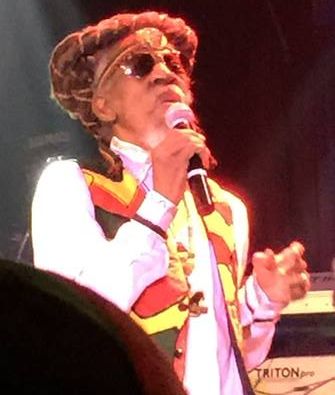
Bunny Wailer live at BB King's, NYC, May 2016, © Jason Gross, 2021
References
- Aylmer, Kevin. "Bunny Wailers' Liberation." The Beat. Vol.9 #1, 1990.
- Grant, Colin. "No Country For Old Men; When Reggae Went Ragga"
- Hussey, Dermot. Liner notes to Bunny Wailer Sings The Wailers (Island, 1980).
- Katz, David. Solid Foundation: An Oral History of Reggae. London; Bloomsbury, 2003.
- Pierson, Leroy and Roger Steffens. "Solomonic Discography." The Beat. Vol. 12 #3, 1993.
- Steffens, Roger. "Electric Bunny Hop." The Beat. Vol.9 #1, 1990.
- Steffens, Roger. "Soul Survivor - "I'm Still Wailing!" - Bunny Wailer Reunites The Original Wailers." The Beat. Vol. 12 #3, 1993.
- Steffens, Roger. Liner notes to Dub d'sco Vol.1 and 2 (RAS, 1999).
- White, Timothy. Catch A Fire - The Life of Bob Marley (New York; Henry Holt, 1983).